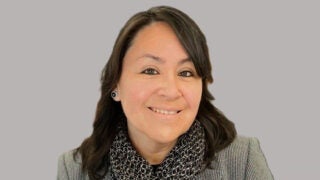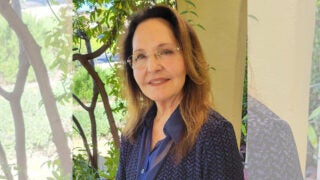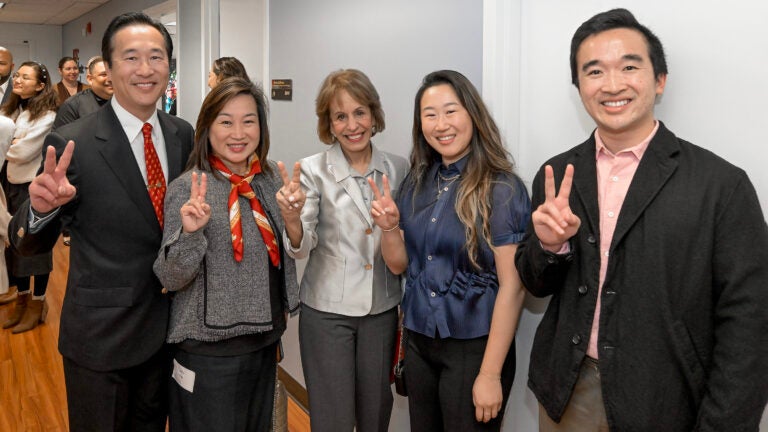
USC President Carol Folt takes a photograph with the Yip family during the Graduate School centennial celebration on April 4, 2024. (Photo/Gus Ruelas)
Why graduate education is vital to our nation
For 100 years, the USC Graduate School has developed advanced educational programs to service the nation’s growing legal, political, commercial and creative infrastructure.
Graduate studies had their formal beginnings at the USC in 1910, but it wasn’t until 1923 that the university formed the Graduate School’s official constitution.
More than 100 years later, on April 4, USC President Carol Folt spoke at a celebration of the Graduate School and talked about why graduate education is vital to the nation and the world.
“When I think about graduate school, I can’t help but think about the fundamental value of graduate education,” Folt said at the afternoon event held at the Graduate School’s offices in the Gwynn Wilson Student Union building. Moreover, she said, “Our competitiveness as a nation hinges on it, our humanity hinges on it, the arts hinge on it, the way we speak to the future hinges on it.” She said her own graduate education was fundamental to her career and that she still celebrates Thanksgiving every year with her friends from grad school.
Folt praised the staff and faculty who work with graduate students in the Graduate School because they are “doing everything to build community within what is our most disparate population from 491 programs.”
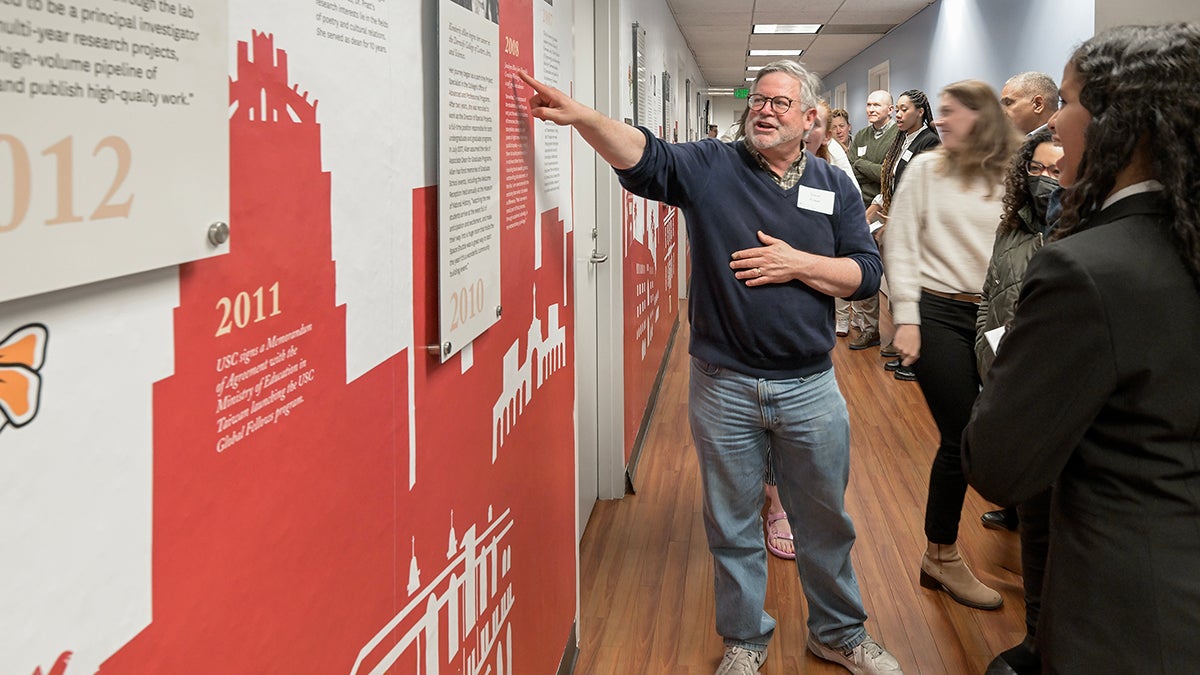
Andrew Stott, dean of the Graduate School, unveiled a mural on the walls of the offices that celebrates the milestones of the city of Los Angeles and the USC Graduate School. “Our story is the story of our city, as USC developed advanced educational programs to service the burgeoning legal, political, commercial and creative infrastructure of the growing metropolis,” he said.
Stott also presented alumna Joycelyn Yip with the Graduate School Centennial Award for outstanding alumni. Yip was a member of the Trojan Marching Band and a former president of USC’s Graduate Student Government from 2016 to 2020, among many other activities. She received her bachelor’s, master’s and doctoral degrees from USC.
As USC recalls the last 100 years of graduate education, Stott said, “Graduate education itself is always looking forward, ever optimistic that there are new breakthroughs around the corner, new discoveries to be found, and new ways of expressing the human condition.”
100 Years of the USC Graduate School and Beyond
1880
USC is founded with 53 students and 10 teachers.
1887
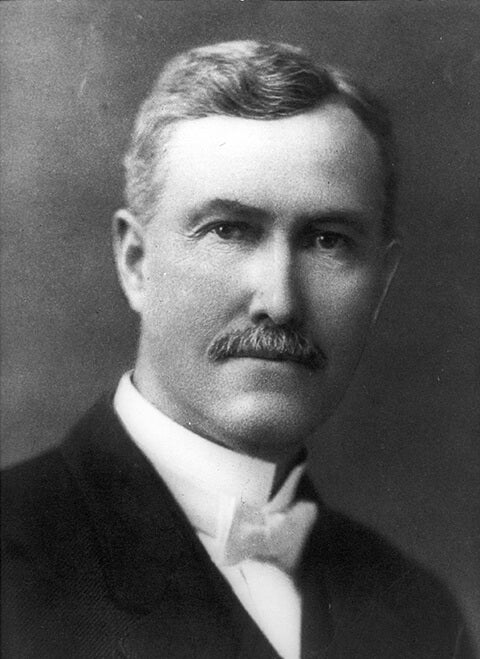 (Photo/USC Libraries)
(Photo/USC Libraries)Future USC president George F. Bovard receives a Master of Arts degree and becomes the first graduate alumnus of USC.
1910
The Graduate Council is established.
1918
Vada Somerville graduates with a Doctor of Dental Surgery, becoming the first Black woman to be licensed to practice dentistry in California. She later co-founded the Los Angeles County Human Relations Committee and established the Pilgrim House Community Center, designed to assist Black families who migrated to Los Angeles during World War II.
1923
The Graduate School is founded and Rockwell Dennis Hunt is named the first dean. Trojans form the Associated Students of the Graduate School to increase the spirit and solidarity among graduate students.
1927
USC confers its first PhD to David Welty Lefever in the School of Education. Lefever’s dissertation explored “The Prognostic Values of Certain Groupings of the Test Elements of the Thorndike Intelligence Examination for High School Graduates.”
1935
The Graduate School celebrates its 25th anniversary with a conference titled “The Social Application of Academic Scholarship” that highlighted the importance of graduate research as a public good.
1937
Emory S. Bogardus (1882-1973) is named dean of the Graduate School. Bogardus joined the faculty of USC as a professor of sociology in 1915. He developed a sociological principle, the Bogardus Social Distance Scale, that is still used today to empirically measure people’s willingness to participate in social contacts with members of diverse racial and ethnic groups.
1939
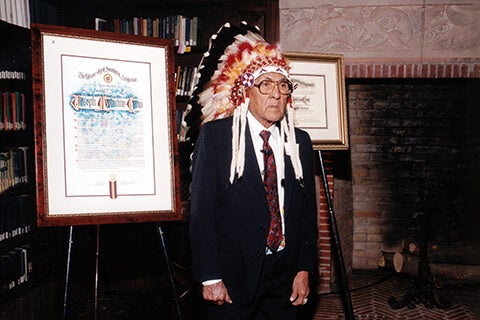 (Photo/Barry Levine)
(Photo/Barry Levine)Joseph Medicine Crow earns a master’s in anthropology while on scholarship, becoming the first member of the Apsáalooke (Crow) to earn a graduate degree. After serving in the U.S. Army during World War II, he was appointed a tribal historian for the Apsáalooke (Crow) Nation for more than 50 years, publishing seminal and influential works about Native American history and culture. He received an honorary doctorate in 2003; in 2022, the Dr. Joseph Medicine Crow Center for International and Public Affairs was named in his honor.
1951
Corita Kent receives a master’s degree in art history. Born Frances Elizabeth Kent and known as Sister Mary Corita Kent, she was an American artist, educator and former religious sister. In the 1960s, her vibrant serigraphs drew international acclaim and reflected her concerns about poverty, racism and war. Kent’s spiritually informed social commentary promoted love and tolerance.
1952
The National Science Foundation launches the Graduate Research Fellowship Program, which celebrates and supports exceptional graduate students in STEM fields. Approximately 70 NSF fellows are enrolled at USC annually. Brian Leung PhD ’18, who received the fellowship in 2014, now works for the NSF. While at USC, Leung received funding to travel to Washington, D.C., to talk about his research with a congressman who had doubts about the impacts of air pollution. He explained the connection between pollution and Alzheimer’s disease, a link that researchers at USC had explored. He said, “I believe, in that moment, the congressman grasped the power of science and when the time came to cast his vote, he stood with science, not against it.”
1976
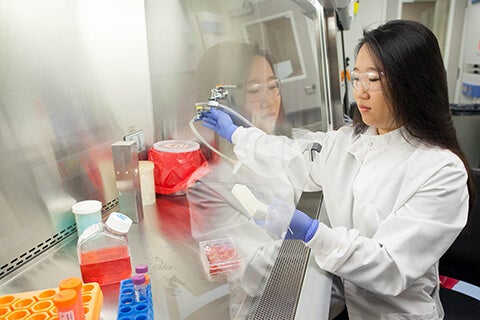 (Photo/Susanica Tam)
(Photo/Susanica Tam)The Rockwell Dennis Hunt Scholastic Award is established, honoring current graduate students who received their undergraduate degree from USC. Forty-seven students have received the award to date, including Joycelyn Yip ’15, MS ’17, PhD ’20. Yip, who served as president of USC’s Graduate Student Government, said the “Beyond the PhD Conference” event, hosted by the Graduate School and the Career Center, influenced her professional trajectory. It “highlighted the strength of the Trojan Family, and it has been a real honor to be part of it as an alum.”
1988
The Dr. Rodolfo Montes Memorial Scholarship is established to recognize USC graduate students who have an outstanding academic record, and a history of involvement in the local Hispanic community. To date, more than 500 students have received support.
1989
A fellowship is created in honor of Theodore Hsi-En Chen (1902-1991) and his wife Wen-Hui Chen (1903 – 2010). Originally from Fuzhou, China, Theodore and Wen-Hui both earned PhDs from USC. After graduating, Theodore Chen became USC’s first professor of Chinese descent in 1939.
1993
Dean Barbara Solomon calls interdisciplinary graduate degrees the “wave of the future.” She lists the study of the environment, multiculturalism, communications and international relations as particularly important for facilitating discussions across disciplines.
2007
For the first time, the number of enrolled graduate students (17,024) at USC exceeds the number of undergraduates (16,384).
2011
USC signs a Memorandum of Agreement with the Ministry of Education in Taiwan launching the USC Global Fellows program.
2018
USC Graduate Student Government holds the first International Student Appreciation Week, which aims to emphasize the presence of international students in the graduate community.

